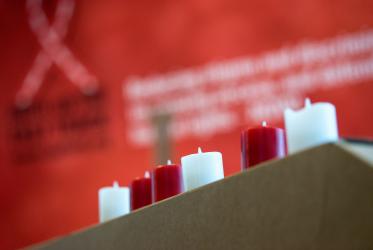The World Council of Churches Ecumenical HIV and AIDS Initiatives and Advocacy (WCC-EHAIA) programme organized a workshop on 27-29 November during which young people in Nigeria could highlight positive masculinity and femininity.
The youth, who belong to a diverse array of faith communities in Nigeria, expressed their appreciation for having a “safe space” in which to look critically at issues related to their well-being, life skills and sex education. They shared testimonies and experience with theologians, women and teachers from Christian and Muslim secondary schools, universities, theological institutions and the Christian Council of Nigeria during the three-day workshop, which drew 30 people.
They also reflected on a working draft of the manual “Positive Masculinities and Femininities with adolescents and young people in faith communities” which is being developed by the WCC-EHAIA. It is one in a series of four manuals (two in French and two in English) being produced with support from the Joint United Nations Programme on HIV/AIDS (UNAIDS) and the American President's Emergency Plan for AIDS Relief (PEPFAR). All four are to be published by spring 2019.
The Nigeria workshop used the manual as a tool in which to provide intergenerational space for adolescents and young people to weigh their issues then make suggestions to simplify and improve the manual for use by both their peers and by adults.
During the workshop, participants discussed issues of gender, as well as sexual and reproductive health.
“it is very crucial that the manual focus on adolescents and young people, and opportunity is given to us to raise our voices, share our stories and our experiences and make adults hear our realities,” reflected David Idowu Wisdom, a youth participant. “This is a great opportunity and we are privileged to be part of this process.”
During a plenary session, Dr Gabriel Undelikwo, a representative from UNAIDS, said: “One good thing about the manual is that it is a document that is relevant to our young people, adolescents, teachers, theologians, imams and pastors, being conscious of the background we are coming from.”
The adolescents and young people present at the workshop concluded that the manual should create safe spaces for adolescents, young people, teachers, imams, pastors, theologians, women and men to continue the conversation in a friendly manner.
In her concluding remarks, Ayoko Bahun-Wilson, regional coordinator for West Africa WCC-EHAIA, said: “Sitting with young people, listening to them, sharing with them is an added value for us, as such opportunities are crucial if we want to reduce new HIV infections among this vulnerable group. But this will not be possible without listening to them and giving them the space to act!”
WCC hones training on attitudes toward HIV treatment (WCC press release of 6 December 2018)
Schools and churches strive to be “safe spaces” for youth to share (WCC press release of 24 October 2018)
In Kenya, issues of young people come to the forefront (WCC press release of 19 Octboer 2018)










